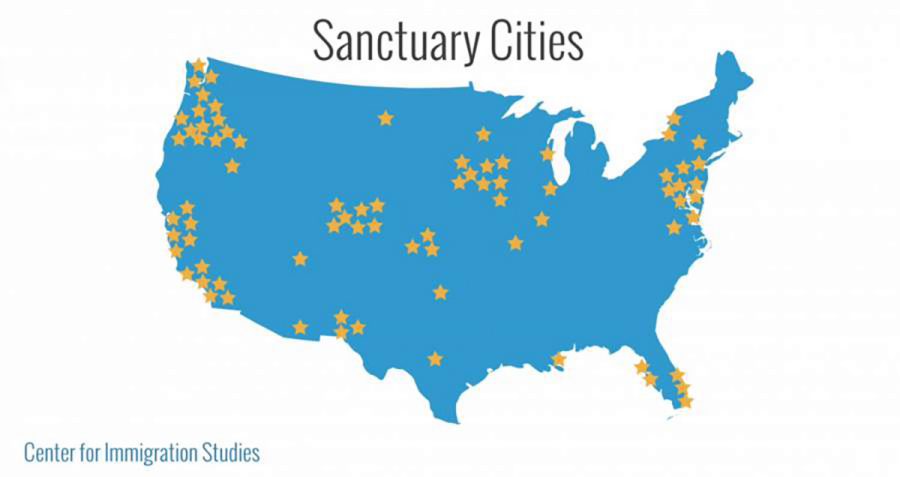UW-Madison Chancellor: Campus cannot be utilized as a immigration sanctuary
Public figures cite legal status of university as primary factor in decision
The map, courtesy of the Center for Immigration Studies, illustrates the cities, counties and states currently labeled as sanctuaries for illegal immigrants in the United States. (SUBMITTED)
December 8, 2016
UW-Madison’s Chancellor Rebecca Blank said she does not have the authority to declare the campus a sanctuary for illegal immigrants last Thursday.
The statement was issued in response to the Associated Students of Madison passing a resolution the day before calling upon Blank and UW System President Ray Cross to pronounce UW-Madison and all schools within the UW system sanctuaries for students who entered the country illegally.
According to a WEAU article, the resolution was passed in a timely manner so the declaration could be made prior to President-elect Donald Trump’s inauguration.
Stephanie Marquis, the UW System’s spokesperson, issued a statement elaborating on how the university system will continue to look at higher forms of government for authority before further action.
“Our students are important to the future of Wisconsin and our nation,” Marquis said. “The challenges we face across different cultures, affiliations and political philosophies. Immigration policy is extremely important to higher education, and we will be watching federal actions very closely.”
Since February 2016, Wisconsin put a bill into action that bans sanctuary cities for immigrants living in the country illegally, according to an article from the Wisconsin State Journal (WSJ).
According to the bill document, the legislation “withholds state funding from municipalities that enact ordinances, resolutions or policies that prohibit employees from inquiring about someone’s citizenship or status or not cooperating with federal immigration authorities.”
According to an article from CNN, the term “sanctuary city” refers to an area that “generally has policies or laws that limit the extent to which law enforcement and other government employees will go to assist the federal government on immigration matters.”
In simple terms, a sanctuary city determines how involved local law enforcement and other local government employees are in immigration issues and determines when or if they are required to turn citizens over to immigration officials.
Applying this definition to the current announcement, the UW-Madison chancellor is stating she does not have the authority to deem the university a sanctuary city because it is not under her jurisdiction and she will be breaking state law under the recently passed bill.
The WSJ article goes on to explain that State Representative John Spiros (R-Marshfield) wrote the bill in response to an event in San Francisco where a woman was shot and killed by a man who had been deported several times according to officials. The San Francisco County sheriff’s office released the man despite requests to detain him by federal immigration authorities.
San Francisco is one of many cities, counties and states across the nation that have sanctuary laws. As stated in the CNN article, San Francisco does not honor immigration detention requests and their law prevents “employees from cooperating with federal immigration enforcement efforts” due to their 26-year-old law called the City of Refuge ordinance.
According to the Center for Immigration Studies, there are about 300 jurisdictions that have been identified by the Immigration and Customs Enforcement that hold a policy that is non-cooperative and obstructs federal immigration enforcement.
To become a sanctuary city, county or state boils down to the area deciding as a whole to provide shelter for illegal immigrants. As stated in an article from thenation.com, there are four common ways cities and states can become sanctuaries:
— Limiting cooperation with immigration and customs enforcement;
— Ensuring access to legal assistance;
— Reducing immigrant contact with the criminal justice system;
— Improving conditions for immigrants.
One of the longest known sanctuary cities in the nation, San Francisco has had no change in crime rates unlike common assumptions, according to an article from The Washington Post. Research in the article showed that immigrants in the area tend to have lower crime rates than the national average.
One of the biggest complaints in response to the announcement from Madison is from the vast majority of the UW System: students. As stated in the WEAU article, the Associated Students of Madison expressed the urgency of the resolution due to the concern once President-elect Trump is ushered into office he will deport students who entered the country illegally as minors.
In terms of how UW-Eau Claire will be affected by all of this, the Assistant Chancellor for Facilities and University Relations, Mike Rindo, and the Assistant to the Chancellor for Affirmative Action, Teresa O’Halloran, said they have no comment.
Carlos Diaz, a senior international relations student, wrote in an email the term “illegal” is not a noun, but a label that is frequently inaccurate and harmful to people. He praised the actions of the Associated Students of Madison and noted that, short of a court order, universities have the right to withhold student information from immigration officials.
“Fear is overwhelmingly a felt emotion in the Hispanic community and for many a university is seen as a safe place,” Dias wrote. “If UW-Eau Claire takes up this situation, I think they have a responsibility to best address the needs of their students, many of whom, look to the university as safe place.”



